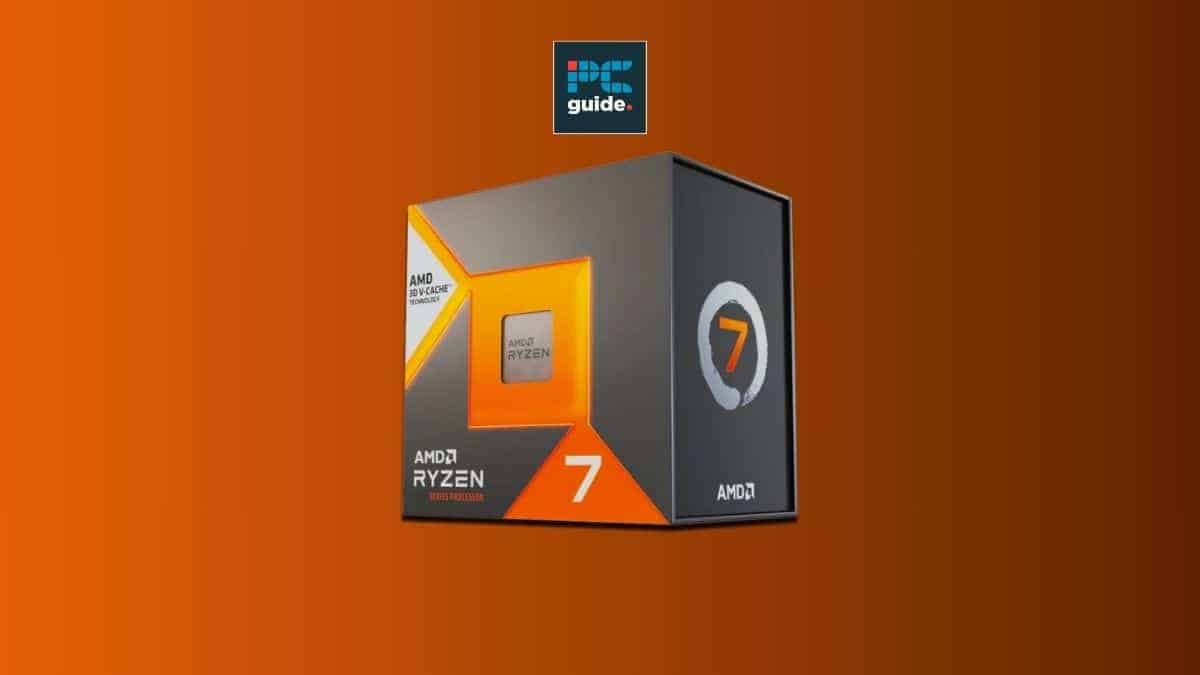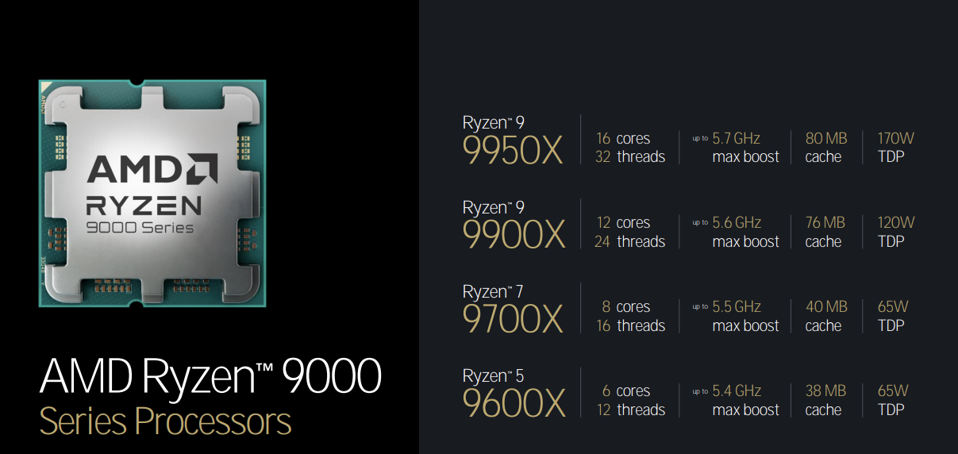AMD Ryzen 9000 Series CPU release dates & latest updates

Table of Contents
AMD originally unveiled the Ryzen 9000 Series release date for the end of July, but this has since been delayed until August 8th, followed by August 15th for further models. As we reached the 8th the CPUs were released, although UK retailers have been struggling with stock.
Now that AMD has officially announced its latest Ryzen 9000 processors, it’s time to take a closer look at when exactly the AMD Ryzen 9000 series release date is. It’s been over a year and a half since the 7000 series CPUs arrived so it was time for Team Red to bring something new, especially as competition from Intel Arrow Lake is heating up. AMD also released the 8000G APU series this year following CES 2024, but that still sticks to Zen 4.
Amazon's Spring Sale is now live!
Amazon's Spring Sale features deals on everything from the latest CPUs to high-powered gaming monitors.
- AMD Ryzen 9 9900X - 26% OFF NOW!
- AMD Ryzen 9 9950X - 18% OFF NOW!
- SAMSUNG 990 PRO 4TB SSD - 40% OFF NOW!
- SAMSUNG 49-inch Odyssey QD-OLED Monitor - 41% OFF NOW!
- Lenovo Legion 5i RTX 4070 Gaming Laptop - 13% OFF NOW!
- WD_BLACK 8TB SN850X SSD - 32% OFF NOW!
*Stock availability and pricing subject to change depending on retailer or outlet.
AMD’s Zen 5 architecture is in the Ryzen CPU lineup, launched in 2025 alongside the Ryzen 9000 chips (Granite Ridge). According to RedGamingTech, Zen 5 aimed to achieve a 20-30% improvement in IPC compared to its existing Ryzen Zen 4 predecessors. But the reviews of the 9700X weren’t exactly too thrilling, seeing an uplift of up to 10% at max compared to the last gen in performance. But the primary boost in its offering comes with improved power efficiency and lower power requirements.
This advancement is largely attributed to AMD’s emphasis on optimizing efficiency and power by enhancing single-core performance. This will be an upgrade over AMD's 7000 desktop series which has been around since 2022 and was the first to adopt the AM5 socket.
AMD Ryzen 9000 Zen 5 release date
The wait for an official Ryzen 9000-series release date is over, with the brand confirming that August 8th and August 15th will see the products hit retailers.
- August 8th: Ryzen 5 9600X and Ryzen 7 9700X
- August 15th: Ryzen 9 9900X and Ryzen 9 9950X
Previous speculation was fueled by insights from industry insiders and analysts keenly observing AMD’s patterns and market strategies throughout the years. Looking back at AMD’s previous launch timelines, such as Zen 4, we thought we could be looking at September as a more realistic expectation; or perhaps even earlier.
- Ryzen 7000: September 2022
- Ryzen 5000: November 2020
- Ryzen 3000: July 2019
This pattern of Autumn/Fall releases aligns with AMD’s history of introducing new technology in the latter part of the year, potentially setting the stage for another significant unveiling during that time frame. It’s the last stop on the CPU core roadmap evolving from 5nm of Zen 4 down to 4nm with Zen 5 which also incorporates the V-cache lineup and Zen 5c which we know little about at the time of writing.
Are there any AMD Ryzen 9000 pre orders yet?
Just like the 7000 series that came before, the following models will be the first available, now that AMD has officially announced them. Although these are coming in batches, there is still little pre order info on them and it depends on the retailers you choose.
- AMD Ryzen 9 9950X
- AMD Ryzen 9 9900X
- AMD Ryzen 7 9700X
- AMD Ryzen 5 9600X
We’ll be keeping a close eye on when are where you can grab one. Check our dedicated where to buy AMD Ryzen 9000 series CPUs page for more details. But for the ones first out, you can find the listings for where to buy 9700X and where to buy 9600X to get a chance at buying or preordering the chips as some seem to be still sold out or unavailable.
AMD Ryzen 9000 Zen 5 specs
The AMD Zen 5 architecture is shaping into an intriguing update in the Ryzen desktop CPUs, with specifications that aim to balance core count stability with significant architectural advancements. Despite reported leaks suggesting the Zen 5 generation will maintain a maximum of 16 cores, mirroring the current Zen 4 offerings, there’s a buzz around the other improvements that might not center on increasing core counts or clock speeds.
| Specification | Details |
|---|---|
| Core count | 6-16 cores |
| Thread count | 12-32 threads |
| CPU process | TSMC N4 (4nm) |
| iGPU | RDNA 2 |
| Socket | AM5 |
| Memory | DDR5-6400 |
| Cache | L2: 16MB / L3: 64MB |
| TDP | 65W-170W |
One of the notable developments rumors for Zen 5 is an initial launch using a 4nm processor, with plans to introduce a 3nm option later on in its release. This approach marks a progression from Zen 4, which is available with both 5nm and 4nm CPUs. The transition to smaller process nodes is expected to enhance efficiency and performance, even if clock speeds don’t see a significant jump.
Leaked information from YouTuber Moore's Law Is Dead hints at a 10-15% increase in IPC from Zen 4 to Zen 5, with the potential for even greater improvements based on varying leaks. Despite RedGamingTech’s reports of a potential decrease in clock speeds for the Ryzen 9000 series, the anticipated enhancements in core technology should offset this, leading to a noteworthy performance uplift for PC gaming. More recent rumors even point towards up to a 40% improvement.
Furthermore, Zen 5 is rumored to support faster memory natively and may introduce support for FP16 AVX512 instructions, significantly expanding its computational capabilities. An increase in CPU cache sizes across L1, L2, and L3 is also on the cards, promising to boost processing efficiency and graphics speed across a wide range of applications for gamers.
AMD Ryzen 9000 Zen 5 pricing
Just before the release of the processors, AMD confirmed the Ryzen 9000 pricing. We see a slight drop compared to the previous generation. The lower price offers some improvements and value over the 7000 series if the performance isn’t that much better in comparison.
| Ryzen 9000 CPU | Launch Price | Ryzen 7000 CPU | Launch Price |
| Ryzen 9 9950X | $649 | Ryzen 9 7950X | $699 |
| Ryzen 9 9900X | $499 | Ryzen 9 7900X | $549 |
| Ryzen 7 9700X | $359 | Ryzen 7 7700X | $399 |
| Ryzen 5 9600X | $279 | Ryzen 5 7600X | $299 |
AM5 Socket – Possible improvements
AMD’s approach to compatibility and user convenience is set to continue with the introduction of the next generation Zen 5, leveraging the AM5 socket introduced with the Ryzen 7000 series in the fall of 2022. This strategy echoes AMD’s past success, where users of high-end motherboards from the Ryzen 1000 series could easily upgrade to Ryzen 3000 or even 5000 CPUs with minimal fuss, requiring only a few BIOS updates while retaining their existing memory, power setup, and more. With Zen 5, AMD aims to maintain this seamless upgrade path by ensuring that the AM5 socket remains consistent across both Zen 4 and Zen 5 architectures. This means that cooling solutions and CPUs will be interchangeable.
Owners of X670E, X670, or B650 motherboards will have the flexibility to install a Zen 5 CPU into their existing system, unlocking the advancements and performance improvements of the new generation without the need for a complete system overhaul. This backward compatibility not only enhances the value of AMD’s ecosystem but also reinforces the company’s commitment to user-friendly upgrade paths, something you may criticize Intel for on the flip side.
AMD Ryzen 9000 Zen 5 – Performance
There are plenty of reviews now out for the 9700X and 9600X showing off the performance of these CPUs. There doesn’t seem to be a massive improvement but certainly around 10% while the efficiency has improved with the new release.
The anticipated performance leap with AMD’s new CPUs is generating considerable excitement, fueled by significant architectural enhancements and increased cache capacities. If the rumors hold, the processors are set to receive a substantial boost in IPC—up to 30%—coupled with a new cache design and higher cache quantities. These improvements suggest that Zen 5 CPUs could deliver exceptional speed, marking a notable advance over previous generations. No need for speculation any longer though, as we can see that a 16% IPC increase is officially confirmed by AMD, with gains over rivals Intel as well.
Beyond raw processing power, these upcoming models are expected to support faster memory and incorporate new technologies that further bolster its performance credentials. The continuation of the AM5 socket into this new generation adds another layer of appeal, offering stability and familiarity for users. This makes Zen 5 particularly attractive for those who may have bypassed the initial wave of AM5-based CPUs from the Ryzen 7000 series.
With Zen 5, users can look forward to not only a significant performance uptick but also the ability to leverage faster memory speeds and cutting-edge features, all while remaining within the well-established AM5 ecosystem. This combination of speed, technology, and platform stability positions Zen 5 as a compelling upgrade for anyone looking to harness the latest in CPU advancements.
Will desktop Ryzen 9000 be Zen 5?
The Ryzen 9000 series will be based on the Zen 5 architecture. This next-generation lineup is set to introduce significant performance enhancements, including improvements in instructions per cycle (IPC) and efficiency, thanks to AMD’s focus on optimizing single-core performance and other architectural advancements.
Will AM5 support the Ryzen 9000?
AM5 will support Ryzen 9000 CPUs. AMD’s AM5 socket, which debuted with the Ryzen 7000 series, is designed to maintain compatibility with future generations, including the Zen 5-based Ryzen 9000 series. This decision reflects AMD’s commitment to providing a stable and forward-thinking platform, allowing users to upgrade their CPUs without the need to replace their entire motherboard, provided they have an AM5-compatible motherboard such as the X670E, X670, or B650.
Final thoughts
In a year of upcoming Intel and Nvidia launches, AMD’s Zen 5 architecture, set to power the Ryzen 9000 desktop processors, promises substantial advancements in performance, including potentially significant IPC gains, improved efficiency, and workloads. With the continued use of the AM5 socket, AMD ensures backward compatibility, making future upgrades more accessible for users.






